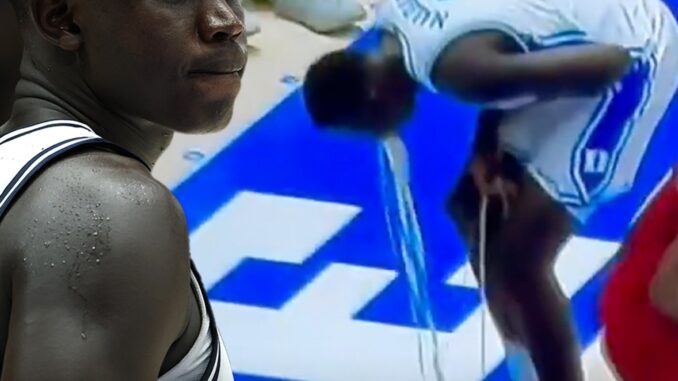
Duke Basketball Player Khaman Maluach Vomited During Game Due to Poisonous Substances in Rapid Gatorade Consumption, Says Coach Jon Scheyer
In an unexpected turn of events during a recent Duke basketball game, freshman center Khaman Maluach shocked fans and teammates when he vomited on the court mid-game. Following the incident, head coach Jon Scheyer addressed the media and suggested that the reaction may have been caused by “poisonous substances” consumed through a rapid intake of Gatorade.
The event occurred during the second half, when Maluach, a towering 7-foot-2 center from South Sudan, left the game after experiencing visible discomfort. Moments later, he was seen vomiting near the team bench. Though initially thought to be a standard case of exhaustion or dehydration, Coach Scheyer’s postgame comments offered a more alarming explanation.
“Khaman had been cramping badly and tried to rehydrate quickly,” Scheyer said. “He ended up drinking a lot of Gatorade in a short amount of time, and it caused a bad reaction—possibly from some of the ingredients not sitting well in his system. It was like a toxic overload. It wasn’t food poisoning, but something in there didn’t agree with him.”
Scheyer’s use of the term “poisonous substances” raised eyebrows, especially considering Gatorade is a trusted sports drink used widely across professional and collegiate athletics. However, experts suggest that under certain conditions, rapid ingestion of electrolyte-heavy drinks can upset the stomach or overwhelm the digestive system, especially when the body is already under physical stress.
While there has been no official confirmation from Duke’s medical team about contamination or toxic contents in the drink itself, it’s likely that Scheyer was referring to a physiological response rather than actual poisoning. In other words, Maluach’s body may have reacted negatively to the combination of dehydration, intense cramping, and the sudden influx of sugar, sodium, and electrolytes.
Sports medicine professionals agree that hydration strategies must be carefully managed, especially for elite athletes. Drinking too much too fast—especially after heavy exertion—can cause nausea, vomiting, and, in rare cases, electrolyte imbalances. Gatorade, while effective for rehydration, is not immune to misuse.
Maluach, who is only 18 years old and one of the top international prospects in college basketball, is still adjusting to the physical demands of NCAA play. Coach Scheyer assured the media that the issue, while alarming, was not serious.
“He’s okay now,” Scheyer said. “It looked worse than it was. He was evaluated by our medical staff, and he should be back to normal for practice. We’re making sure he stays hydrated the right way moving forward.”
The game resumed shortly after the incident, and Duke went on to secure a win. Maluach did not return to the court but was seen on the bench in good spirits.
As of now, there are no plans to test the Gatorade or change Duke’s hydration protocols, but the incident serves as a reminder of how even common athletic routines—like rehydration—need to be managed with care.



Be the first to comment